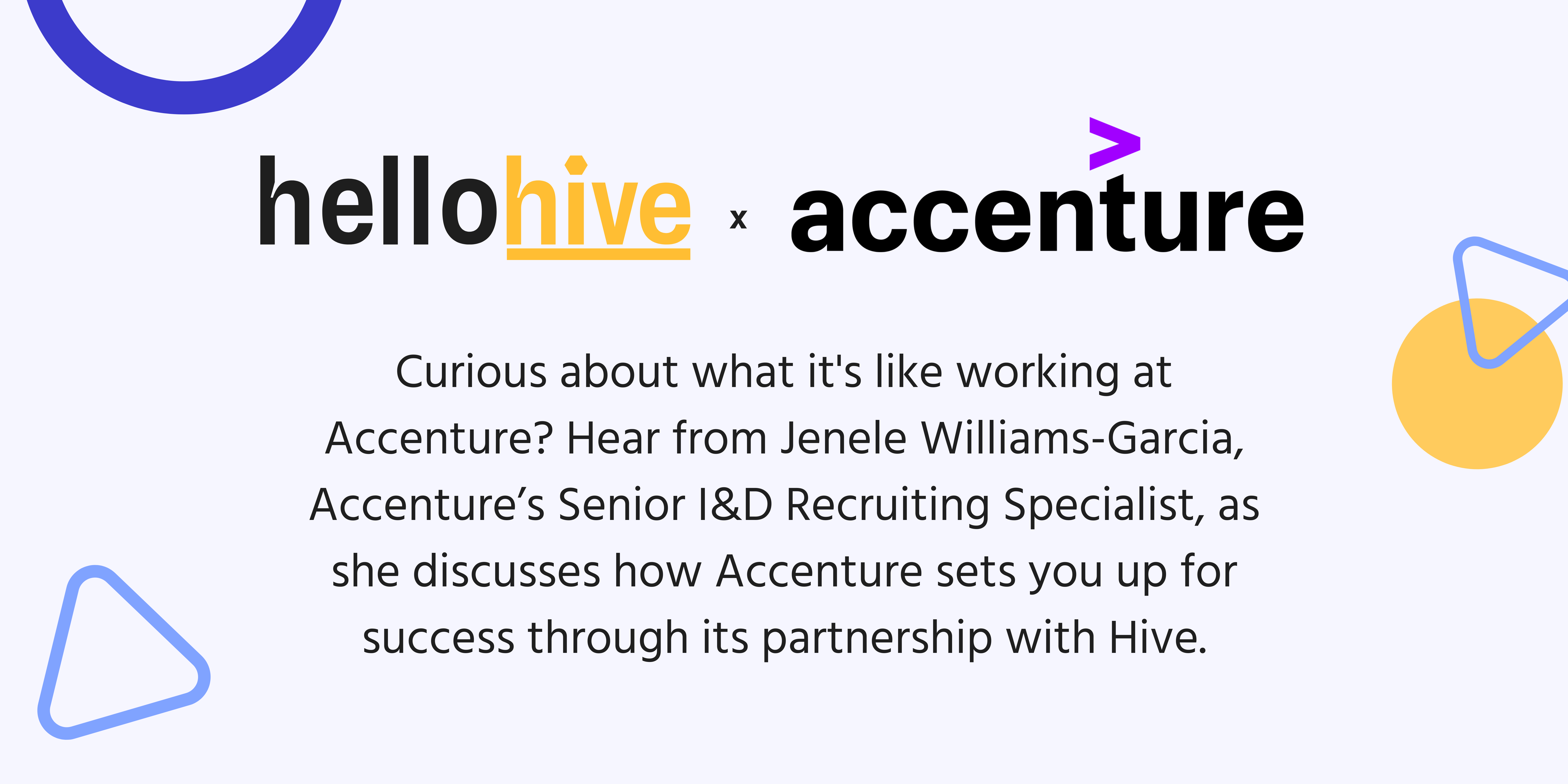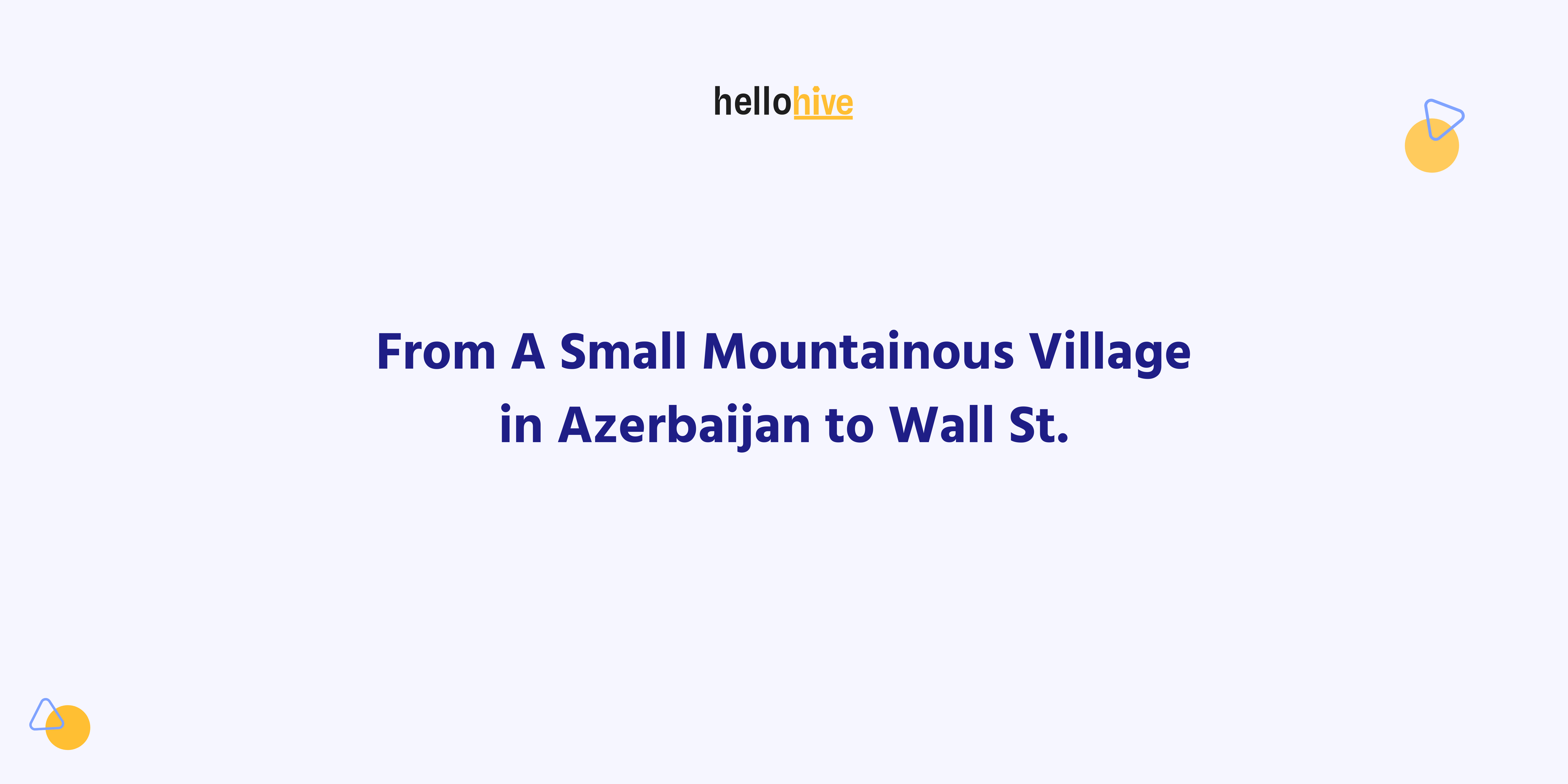Q: How would you explain the relationship between Accenture and HIVE?
A: We’re partners. HIVE serves as an opportunity to meet the next generation of talent where they are, and has given us access to students we wouldn’t have been able to interact with. Having this partnership has been collaborative, innovative, and is right on brand with what we value at Accenture, using technology at the forefront, putting people first – describing yourself in 5 emojis – working collaboratively as we grow and innovate together. We have a strong partnership and are looking forward to keeping the train going in the future.
Q: What has been the most unique part about partnering with Hive?
A: The most unique part about partnering with HIVE has been utilizing their technology. Having the resumes in an easy-to-read format has been most helpful, along with being able to see the students’ diversities upfront. Learning more about them adds more color to the candidate.
Q: Why do you prioritize pipelining and recruiting entry level talent?
A: We not only want to see you come to Accenture – we want to make sure you’re a well-rounded professional wherever you go. Through opportunities like our innovation challenges, student leadership program and tech series, we’re making an investment to our students at the early level to help them soar wherever they go. Some of the things they’re learning are all things that will help them post college – we want to be there with them in the beginning to give them that opportunity to learn without feeling the pressure to have to learn. We want you to learn about us, and to learn more about yourself through the process.
Q: Was it a unique experience to work with first and second year students?
A: This has been the first time we’ve been able to do something intimate with students. Having such a small group of 30 students allowed us to get to know them and what they’re interested in. Doing it so early in their career lets them ask questions about what they’re interested in, whether it’s Accenture, consulting or finance
Q: We talk a lot about bringing together tech and human ingenuity. What stands out as something you hadn’t seen before?
A: The filtering on the dashboard from the employer view was something we hadn’t seen before. Who have I already spoken to, who am I interested in reaching out to? Having that transparency on both ends as a partner helps with the candidate on the resume –being able to see what they’re relating to, what diversities they associate, their socioeconomic background and where they come from. The resume gives us a holistic picture of who the individual is outside of their accolades. It makes you want to learn more about them without even meeting them. It also helps to curate conversations based on their backgrounds and start to align opportunities.
I was also surprised to see we’ve had a very high participation rate – over 90% in a week – which in a virtual environment has seen a lower attendance rate. Being able to have their full attention every week 2-3x a week – all were extremely engaged, asked questions, thanked the speakers and were extremely professional. They showed up, which was the biggest thing we were very surprised at. They really put their best foot forward.
Q: We had over 200+ applicants, and 30 were accepted. My thought was making them work to get to the application increased the quality of student engagement. Do you think the requisite piece of doing something before they applied played into them showing up?
A: Going through the entire process at HIVE, then going through the entire process at Accenture showed who was actually interested in the program. Once they got here, they were able to come in, learn, ask questions and engage in things they were really interested in.
We want to empower students – your diversity is not something you should want to hold back, it’s something you should bring to the table because it makes you you. It’s part of your story. Not everyone is the same, and not everyone has the same diversities. Highlighting that professionally helps you be the best person you want to be.
Q: We talk a lot about people first. Was there a piece of this that you were able to have them get to know you as a person in addition to getting to know you through the job they’re networking for?
A: We had a social where we had everyone describe themselves in 5 emojis, and speakers described themselves in 5 emojis. We were about to marry our partnership with HIVE to adapt what you stand for and what we want to be a part of. Adding that informal way of getting to know them helped us build a rapport with them.
Q: Was there anything you heard from students that made you proud or excited?
A: The best thing I heard was, “I had no idea what consulting was until the program.” As a first/second year student, it’s hard to see what you’re interested in outside of an internship. Giving them visibility outside of a career fair or info session helped them understand it and allowed us to speak to what we do in a simplified way. That has been the best and most valuable part of the program – giving folks an opportunity to see something they may have never heard of. Being able to have a little bit of understanding helps even the playing field and helps you be the best you can be once you get here.
Q: I’m a huge fan of reverse mentoring – was there anything you or your team learned that you maybe didn’t know before that you’ll carry forward with next generation talent?
A: One of the biggest things we noticed early on was the question around work life balance. What does the culture look like? What’s the work life balance? How do you handle your mental health? It’s going to change the way we speak when we go to our next generation talent to understand it’s not just work work work – it’s important they feel valued and that they’ll have a life outside of work. We work hard, but there’s also balance.





